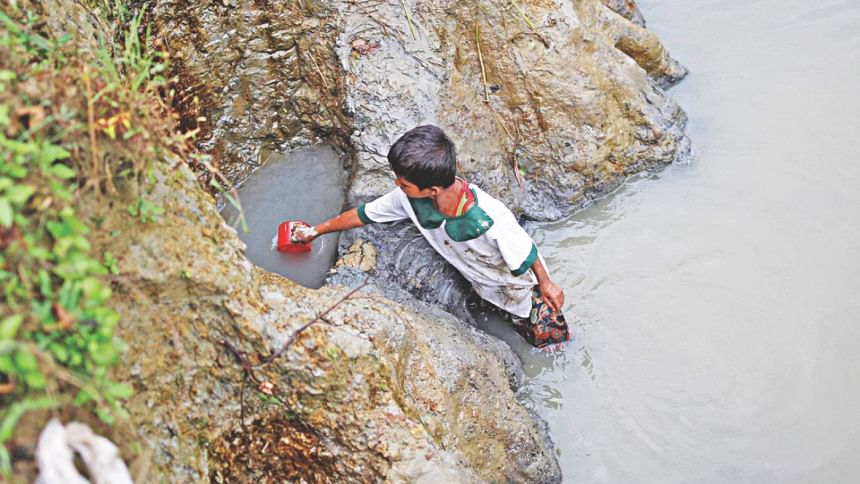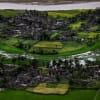'Beijing with Dhaka'

Chinese Ambassador in Dhaka yesterday said his country stands by Bangladesh and hopes there will soon be a peaceful solution to the Rohingya crisis.
"We expressed our commitment that we stand by Bangladesh [on the Rohingya problem]. We do hope that this issue will be settled as soon as possible peacefully," Ma Mingqiang said at a function at the Economic Relations Division in the capital.
The ambassador and Disaster Management and Relief Ministry Secretary Shah Kamal at the programme signed a certificate of acceptance for firefighting equipment, including escalators, air compressors, generators and forklifts China provided to Bangladesh.
Ma said there are many similarities between the disasters faced by the two countries. "Even today, you're also facing disaster. It's a serious problem of refugees."
Stating that Myanmar and Bangladesh are friendly countries, the envoy said, "We hope our two brothers will sit down and solve this problem. I did see that there's some visible progress in terms of discussion."
Over 600,000 Rohingyas have crossed over from Myanmar into Bangladesh fleeing a military crackdown in response to insurgent attacks on police posts and an army camp on August 25.
The humanitarian crisis stemming from the influx has drawn global attention and become a topic of discussion at the United Nations. The UN Security Council, however, has failed to take any action against Myanmar because of opposition from China and Russia.
Last month, Ambassador Ma said Bangladesh is suffering because of the Rohingya influx while China is also in trouble because there are Chinese investments in Myanmar.
Guo Yezhou, a deputy head of the Chinese Communist Party's international department, last week said China's principle was not to interfere in the internal affairs of another country.
"Based on experience, you can see recently the consequences when one country interferes in another. We won't do it," Guo said.
RALLY FOR MYANMAR ARMY
Also yesterday, tens of thousands of people in downtown Yangon rallied in defence of Myanmar's army, an institution accused by the global community of driving Rohingyas from the country, reports AFP.
Concerned over the atrocities in Rakhine State, US Secretary of State Rex Tillerson phoned army chief Min Aung Hlaing earlier this week and urged a swift and safe return of the Rohingyas.
The US is also weighing targeted sanctions against key military leaders.
The European Union decided not to invite the army chief and other senior commanders of Myanmar armed forces to the EU and its member states.
But inside the country, support for the army has surged -- an unlikely turnaround for a once feared and hated institution that ruled for 50 years and whose lawmakers lost heavily in 2015 polls.
Those elections sent Aung San Suu Kyi's pro-democracy party into power, but the Rohingya crisis has put her government on the backfoot.
Demonstrators carried banners lauding Commander-in-Chief Min Aung Hlaing and rebuking the international community for "pressuring the army".
EU COMMISSIONER TO VISIT CAMPS
EU Commissioner for Humanitarian Aid and Crisis Management Christos Stylianides will arrive in Dhaka this evening to visit the Rohingya refugee camps.
He will go to Kutupalong in Cox's Bazar tomorrow, see the plight of refugees and meet high government officials and depart on the evening of November 1.
The EU has pledged over €51 million for the Rohingyas this year.
"We stand united for the right cause. The cause of stateless people who have suffered for too long: the Rohingya... We have a moral duty to give these people hope," said Stylianides in a statement.
US DELEGATION'S VISIT
Simon Henshaw, US acting assistant secretary of state for the Bureau of Population, Refugees, and Migration, would lead a delegation to Myanmar and Bangladesh on October 29-November 4 to discuss ways to address the humanitarian and human rights concerns stemming from the Rakhine State crisis.
The issue of improving the delivery of humanitarian assistance to displaced people in Myanmar as well as in Bangladesh, would be on the delegation's agenda, reports UNB.
A diplomatic source said the delegation is likely to visit Myanmar first before coming to Bangladesh on November 2-3.
The delegation would visit affected communities in Cox's Bazar to hear the stories of the people who have fled, assess the impact of the emergency humanitarian response, identify gaps in assistance, and advise on ways to improve the delivery of humanitarian assistance.

 For all latest news, follow The Daily Star's Google News channel.
For all latest news, follow The Daily Star's Google News channel. 








Comments